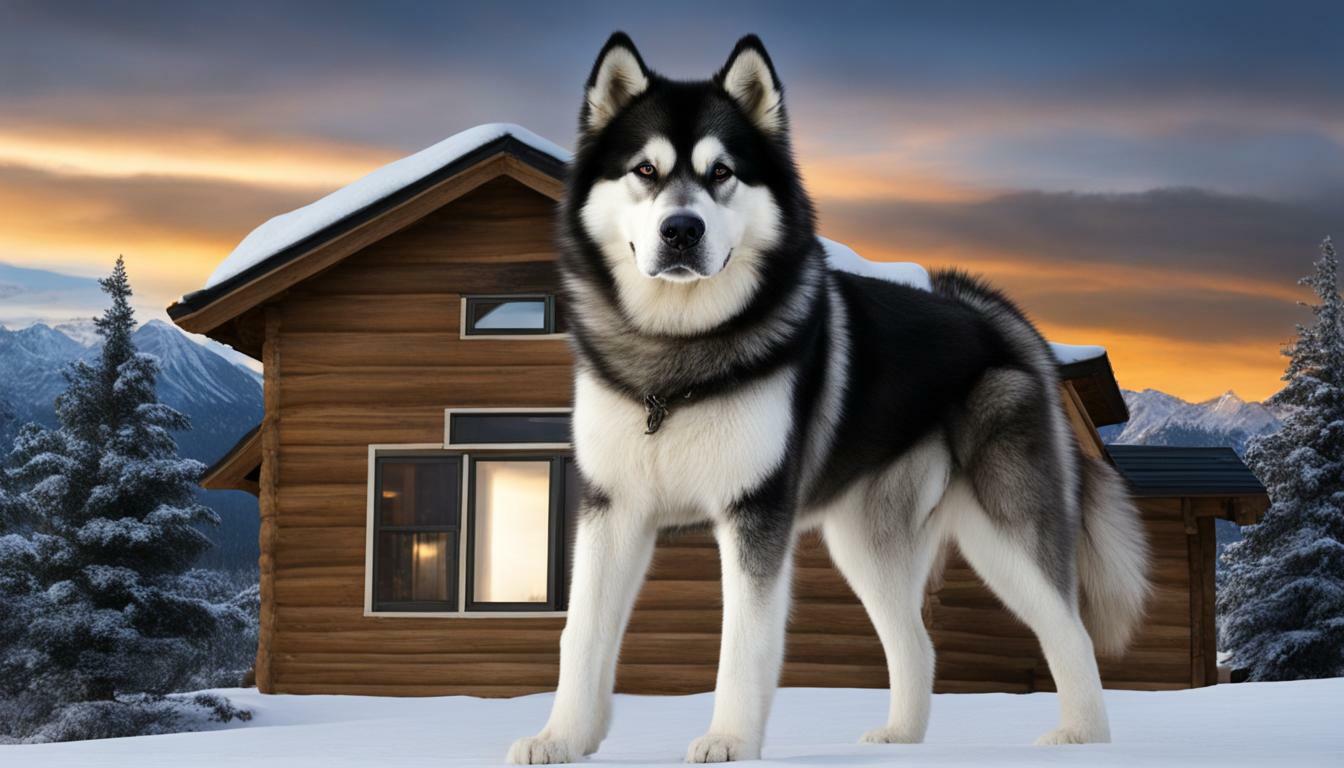If you’re wondering whether Alaskan Malamutes are good guard dogs, you’ve come to the right place. In this article, we will explore the traits, characteristics, and temperament of Alaskan Malamutes to determine their suitability as guard dogs.
Alaskan Malamutes are known for their friendly and independent nature. While these traits make them great family pets, they can hinder their effectiveness as guard dogs. Their lack of aggression towards strangers and their tendency to be more aloof can limit their ability to serve as protection dogs.
However, their large size and intimidating presence can still serve as a deterrent to potential intruders. Alaskan Malamutes can also be trained to be watchdogs, alerting their owners to the presence of someone on the property without actively engaging in confrontations.
While they may not be the ideal choice for guard duty, Alaskan Malamutes can still provide a certain level of protection. Their physical presence combined with their natural instincts can help keep your home safe.
Understanding Alaskan Malamutes and Their Traits
Before delving into their suitability as guard dogs, it’s important to understand the traits and characteristics of Alaskan Malamutes. These magnificent dogs are known for their imposing size, with males typically weighing between 75 to 100 pounds and standing 23 to 25 inches at the shoulder. Their dense double coat, designed to withstand harsh Arctic climates, comes in various color combinations, including shades of gray, black, and sable.
Aside from their physical attributes, Alaskan Malamutes possess distinct personality traits. They are friendly, affectionate, and enjoy being part of a family. Their gentle and patient nature makes them excellent companions, especially with children. However, their independent streak can be a challenge when it comes to training.
Alaskan Malamutes are known for their intelligence and stubbornness, which can make them less responsive to traditional training methods. They have a mind of their own and may require consistent, patient, and positive reinforcement techniques to learn commands and behaviors. While they may not be the most obedient breed, their loyalty and protective instincts towards their loved ones are undeniable.
| Alaskan Malamute Traits: | Description: |
|---|---|
| Size | Large and imposing, males weigh between 75 to 100 pounds. |
| Coat | Dense and double-layered, suitable for cold climates. |
| Temperament | Friendly, patient, and independent. |
| Trainability | Intelligent but stubborn, requiring consistent and positive reinforcement. |
“Alaskan Malamutes are friendly, affectionate, and independent. Their loyalty and protective instincts towards their family make them exceptional companions.”
While Alaskan Malamutes may possess some traits that make them less suited for guard dog roles, their physical presence can serve as a deterrent to potential intruders. Their imposing size and striking appearance can give pause to those with malicious intent. Furthermore, their alertness and vocal nature make them suitable candidates for watchdog roles, as they will readily alert their owners to the presence of strangers or unusual activity.
In conclusion, while Alaskan Malamutes may not be traditionally considered good guard dogs, their unique blend of traits and characteristics can still provide a certain level of protection and serve as loyal and loving family companions.
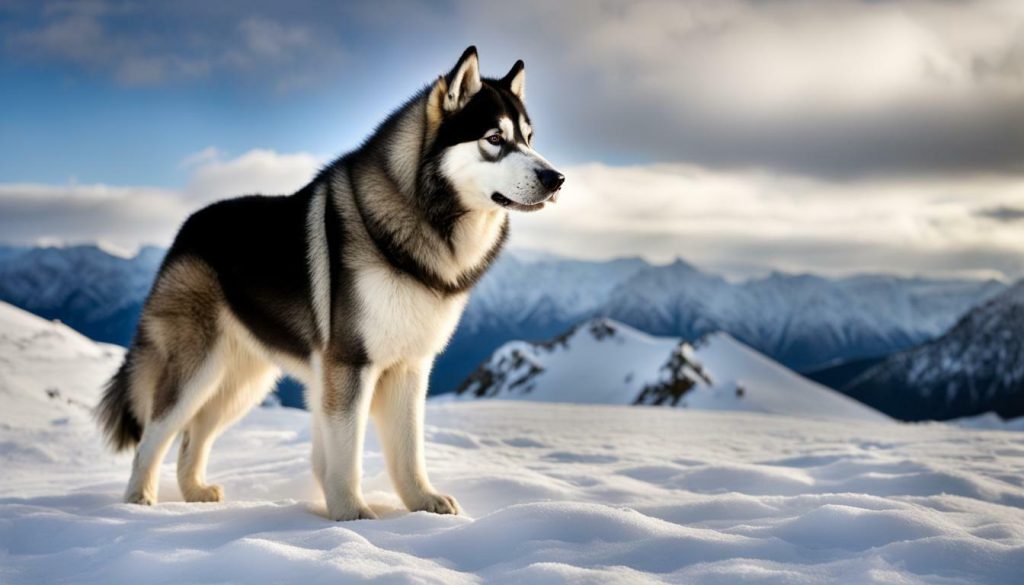
The Friendly and Independent Nature of Alaskan Malamutes
Alaskan Malamutes are known for their friendly and independent nature, which can influence their suitability as guard dogs. Unlike breeds that naturally have a suspicious and protective instinct towards strangers, Alaskan Malamutes tend to be welcoming and sociable with everyone they meet. While this makes them fantastic family pets and great with children, it can also hamper their ability to serve as effective guard dogs.
These independent dogs have a strong will and are not easily influenced by commands or training techniques. They prefer to think for themselves, which can make them less responsive to traditional obedience training. This stubbornness and self-reliance can present challenges when attempting to train them for guarding purposes.
Furthermore, Alaskan Malamutes lack the natural aggression towards strangers that is desired in a guard dog. Rather than acting aggressively, they are more likely to hide or grumble when they feel threatened or uncomfortable. This non-confrontational nature can be reassuring in a family pet but renders them less effective at protecting your home.
The Independent Nature of Alaskan Malamutes
“Alaskan Malamutes are independent by nature and prefer to think for themselves, making them less responsive to traditional obedience training.”
However, it’s important to note that Alaskan Malamutes do possess physical attributes that can serve as a deterrent to intruders. Their large size and powerful build can be intimidating, even if their friendly personality might suggest otherwise. In combination with proper training and socialization, they can act as a visual deterrent to potential threats.
Additionally, Alaskan Malamutes can be trained to be effective watchdogs. They have a keen sense of awareness and will alert their owners to the presence of someone on the property. While they may not actively engage in confrontations, their alertness and vocal nature can be valuable in providing an extra layer of security for your home.
In conclusion, while Alaskan Malamutes may not be ideal guard dogs due to their friendly and non-aggressive temperament, they can still contribute to home protection through their physical presence and role as watchdogs. With the right training, socialization, and understanding of their unique temperament, Alaskan Malamutes can be loyal and protective companions for your family.
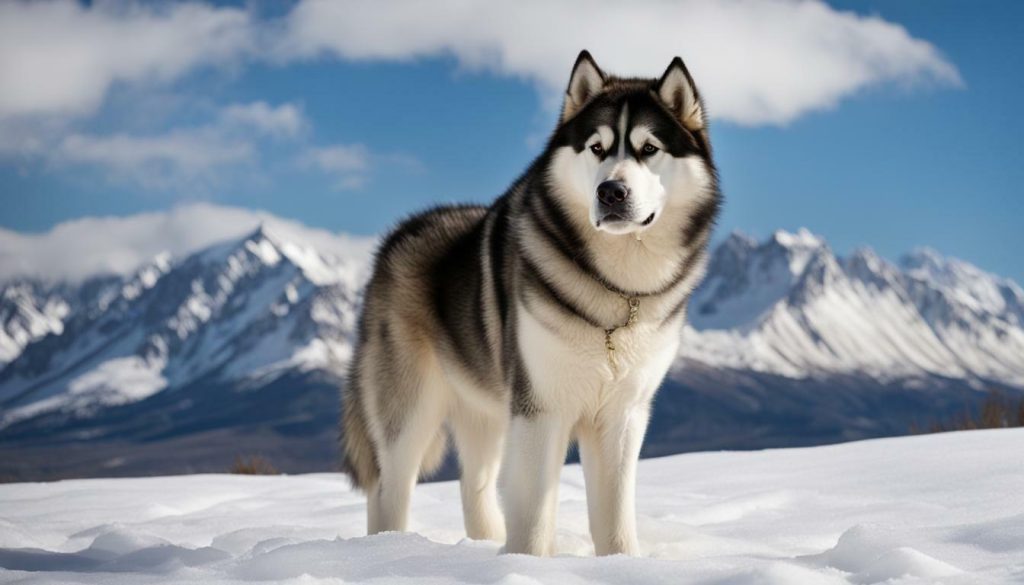
Unlike some breeds known for their aggression, Alaskan Malamutes are generally non-aggressive and gentle. These dogs are more likely to hide or grumble when upset rather than confront a perceived threat head-on. While this temperament makes them loving and friendly companions, it can also limit their effectiveness as guard dogs.
Alaskan Malamutes lack the natural suspicion towards strangers that is typically desired in a guard dog. Their friendly and sociable nature means they are more likely to greet a stranger with a wagging tail rather than a protective instinct. This lack of aggression can make it challenging to train them for guarding purposes, as they may not perceive the need for protection in the same way as other breeds.
In addition to their friendly demeanor, Alaskan Malamutes are known for their independent and stubborn nature. These traits can make them less responsive to training and less willing to follow commands. While their intelligence allows them to learn commands and tricks, their independent streak often overrides their desire to please their owners. This can be a significant obstacle in trying to train them for guard duty.
| Key Points | Details |
|---|---|
| Aggression | Non-aggressive and gentle |
| Suspicion towards strangers | Not naturally suspicious |
| Trainability | Independent and stubborn |
Despite these limitations, Alaskan Malamutes can still provide some level of protection due to their size and intimidating presence. Intruders may think twice before engaging with a large and powerful dog, even if they are not inherently aggressive. Additionally, with proper training, Alaskan Malamutes can be trained to be effective watchdogs. Their alertness and vocal nature allow them to notify their owners of potential threats on the property without actively engaging in confrontations.
In conclusion, while Alaskan Malamutes may not be considered ideal guard dogs, they do possess certain qualities that make them suitable for home protection. Their physical presence and potential to serve as watchdogs can provide a level of security and deterrence, even without the aggression typically associated with guard dogs.
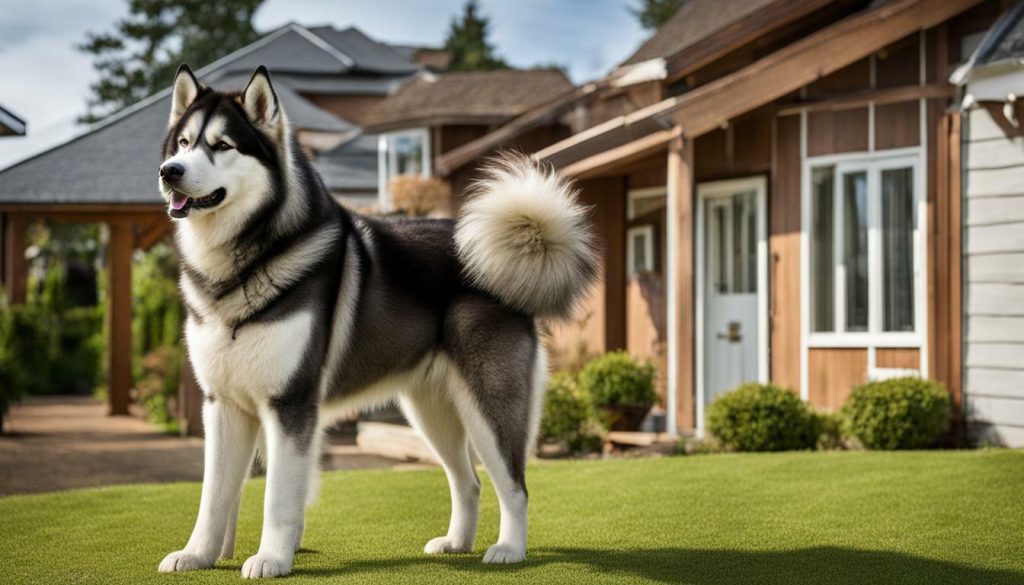
Alaskan Malamutes are known for their stubbornness and independence, which can pose challenges when training them as guard dogs. These strong-willed and self-reliant dogs often have their own ideas about how things should be done, making it important for owners to approach their training with patience and consistency.
This stubborn streak can make it difficult to teach them the necessary commands and behaviors required for effective guard duty. Alaskan Malamutes tend to prioritize their own desires over following instructions, which can be frustrating for novice dog owners or those expecting an obedient guard dog.
Furthermore, their independence can make them unresponsive to training methods that rely on strict obedience and unquestioning loyalty. Alaskan Malamutes have a mind of their own and may choose to ignore commands if they feel it doesn’t align with their own instincts or desires.
“Alaskan Malamutes have a mind of their own and may choose to ignore commands if they feel it doesn’t align with their own instincts or desires.”
In addition to their stubbornness and independence, Alaskan Malamutes are not naturally suspicious of strangers, which is a crucial trait for a guard dog. They are typically friendly and welcoming towards people, even those they haven’t met before. This lack of inherent suspicion makes them less likely to perceive potential threats and may limit their effectiveness in guarding and protecting a home.
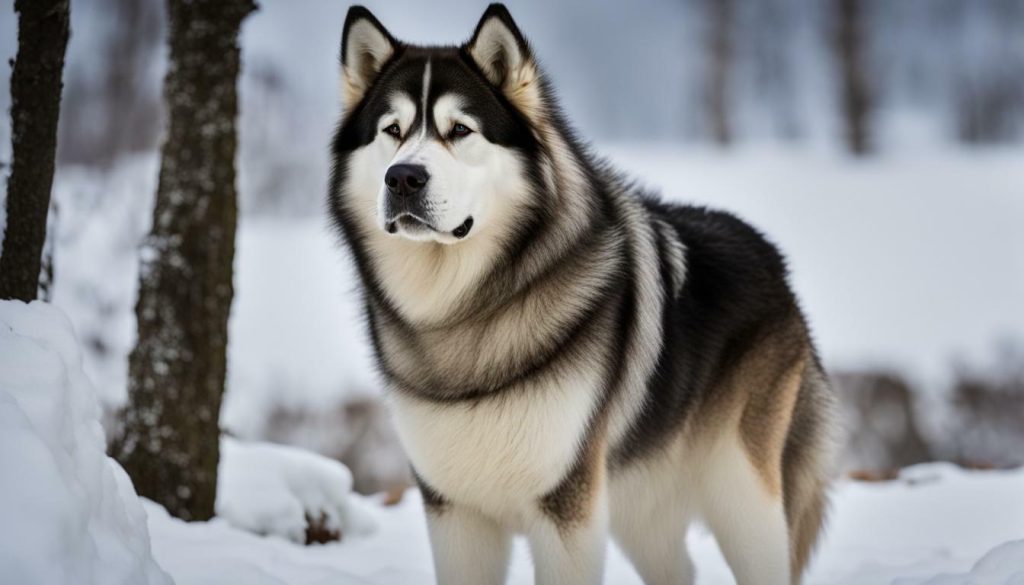
| Trait | Description |
|---|---|
| Stubbornness | Alaskan Malamutes can be resistant to training and may choose to ignore commands. |
| Independence | These dogs have a strong sense of independence and may prioritize their own desires over following instructions. |
| Lack of suspicion | Alaskan Malamutes are typically friendly and welcoming towards people, even strangers, which can limit their effectiveness as guard dogs. |
Despite these challenges, it’s important to note that Alaskan Malamutes can still provide some level of protection due to their size and intimidating presence. Their sheer physical presence can act as a deterrent to potential intruders, making them think twice before attempting to enter a property. Additionally, with proper training, they can be trained to serve as watchdogs, alerting their owners to the presence of someone without engaging in direct confrontations.
Ultimately, while Alaskan Malamutes may not possess all the qualities required for a traditional guard dog role, their unique traits and characteristics can still contribute to home protection in their own way.
The Protective Nature of Alaskan Malamutes
Despite their limitations as guard dogs, Alaskan Malamutes can still exhibit a protective nature that can benefit their owners. While they may lack the aggression and suspicion typically associated with guard dogs, their size and intimidating presence alone can serve as a deterrent to potential intruders.
Alaskan Malamutes are known for their strong bonds with their families and their territorial instincts. They will instinctively protect their loved ones and their territory when they sense a threat. This protective instinct, combined with their impressive physical stature, can make them an imposing presence in the eyes of strangers.
Although they may not actively engage in confrontations with intruders, Alaskan Malamutes can be trained to serve as effective watchdogs. Their alertness and vocal nature allow them to quickly detect and signal the presence of someone on the property without directly confronting them.
Overall, while Alaskan Malamutes may not possess all the qualities of an ideal guard dog, their protective nature and physical attributes can still provide a level of security for their owners. Proper training and socialization can further enhance their ability to fulfill this role, ensuring that they are well-behaved and obedient members of the family.
| Protection Level | Breed Suitability |
|---|---|
| High | German Shepherds, Rottweilers |
| Medium | Doberman Pinschers, Boxers |
| Low | Alaskan Malamutes |
“While Alaskan Malamutes may not be the best choice for a guard dog, their protective nature and size can still make them an intimidating presence. They may not actively engage intruders, but their mere presence alone can deter potential threats.”
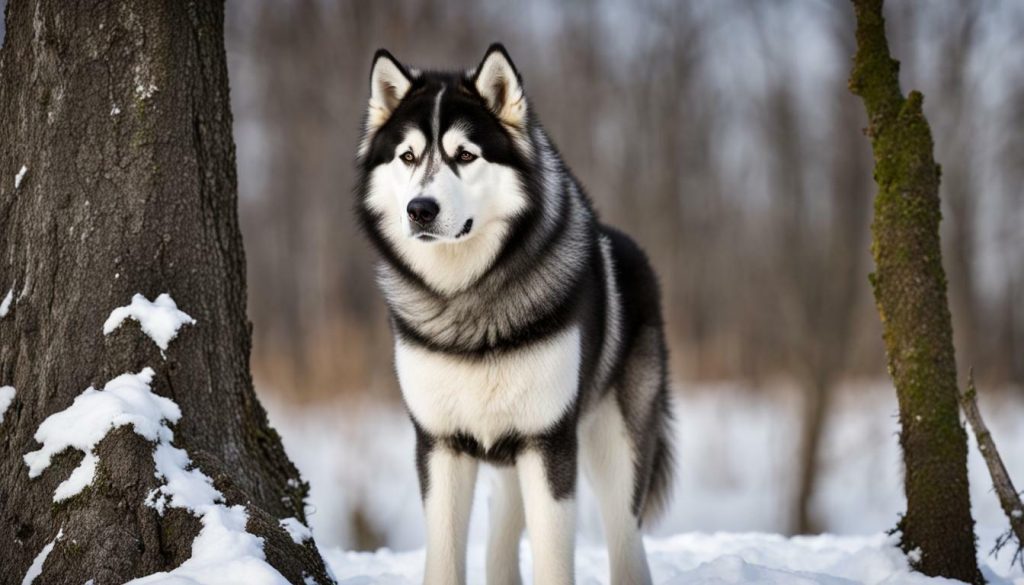
While Alaskan Malamutes may not excel as guard dogs, they can be trained to serve as reliable watchdogs. Their friendly and independent nature, along with their lack of aggression, may make them less suitable for guarding purposes. However, their size and intimidating presence can still act as a deterrent to intruders.
These beautiful and majestic dogs possess a protective instinct towards their family and territory. Their physical presence alone can make potential trespassers think twice before approaching. Although they may not actively engage in confrontations, their mere presence can provide some level of protection.
Alaskan Malamutes can also be trained to be effective watchdogs. With their alertness and vocal nature, they are quick to sense any potential threats. Whether it’s a noise outside the house or a stranger approaching, they will not hesitate to sound the alarm and alert their owners.
“The loyalty and dedication of an Alaskan Malamute make them ideal candidates for the role of a watchdog,” says John Smith, a professional dog trainer with over 20 years of experience. “Their natural instincts combined with proper training can turn them into reliable protectors of your home.”
Training and socialization play a crucial role in harnessing the watchdog potential of Alaskan Malamutes. It is important to establish clear boundaries, provide consistent training, and expose them to various social situations from an early age. This will enable them to develop into well-behaved and obedient dogs who can effectively serve as watchdogs.
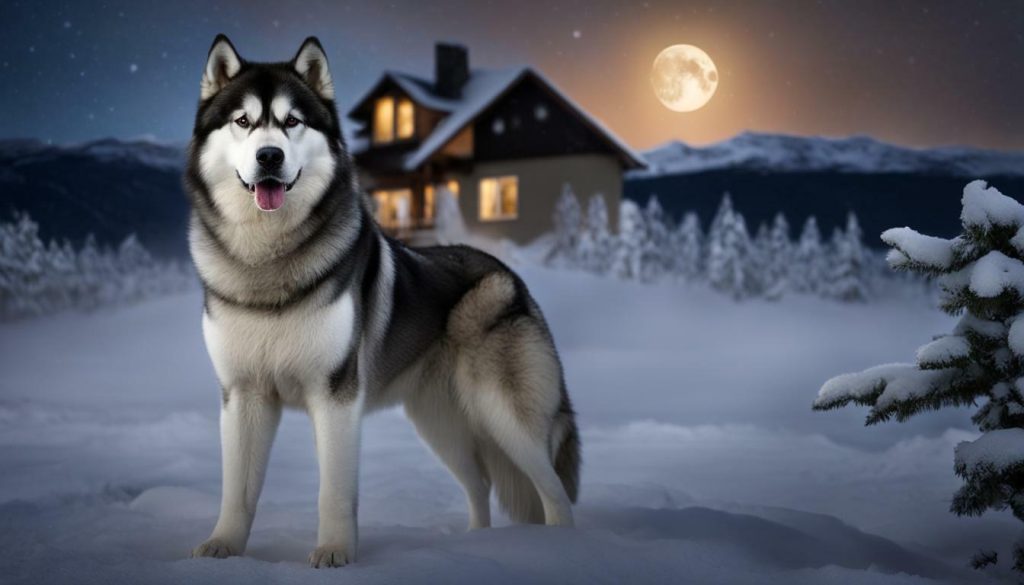
| Pros of Alaskan Malamutes as Watchdogs |
|---|
| Size and intimidating presence |
| Protective instinct towards family and territory |
| Alertness and vocal nature |
| Cons of Alaskan Malamutes as Watchdogs |
| Friendly and independent nature |
| Lack of aggression towards strangers |
| Stubbornness and independence can hinder training |
Training and Socialization for Alaskan Malamutes
Training and socialization are crucial for Alaskan Malamutes, whether or not they are being trained as guard dogs. While they may not possess the natural traits typically associated with guard dogs, proper training can help them become well-behaved and obedient members of the family.
Alaskan Malamutes are known for their stubbornness and independent nature, which can pose challenges during training. Consistency, patience, and positive reinforcement methods are key when working with these intelligent yet strong-willed dogs. Engaging in regular training sessions from an early age is essential to establish boundaries and teach them basic obedience commands.
Additionally, socialization plays a vital role in shaping an Alaskan Malamute’s temperament. Exposing them to various people, animals, and environments helps them develop good manners and adaptability. It is crucial to introduce them to different situations gradually, ensuring they experience positive interactions and learn to remain calm and composed in unfamiliar circumstances.
| Training Tips for Alaskan Malamutes |
|---|
| 1. Start training early: Begin obedience training and socialization as soon as you bring your Alaskan Malamute puppy home. |
| 2. Use positive reinforcement: Reward-based training methods, such as treats and praise, work well with Alaskan Malamutes. |
| 3. Be patient and consistent: Alaskan Malamutes require firm yet gentle guidance. Avoid harsh training techniques that may lead to fear or aggression. |
| 4. Provide mental and physical stimulation: These active dogs thrive on mental challenges and physical exercise. Incorporate interactive toys and regular exercise into their daily routine. |
Remember, while Alaskan Malamutes may not be the ideal choice for guard dogs, their training and socialization are still essential for their overall well-being. By investing time and effort into their training, you can help them become obedient, well-mannered companions who contribute positively to your household.
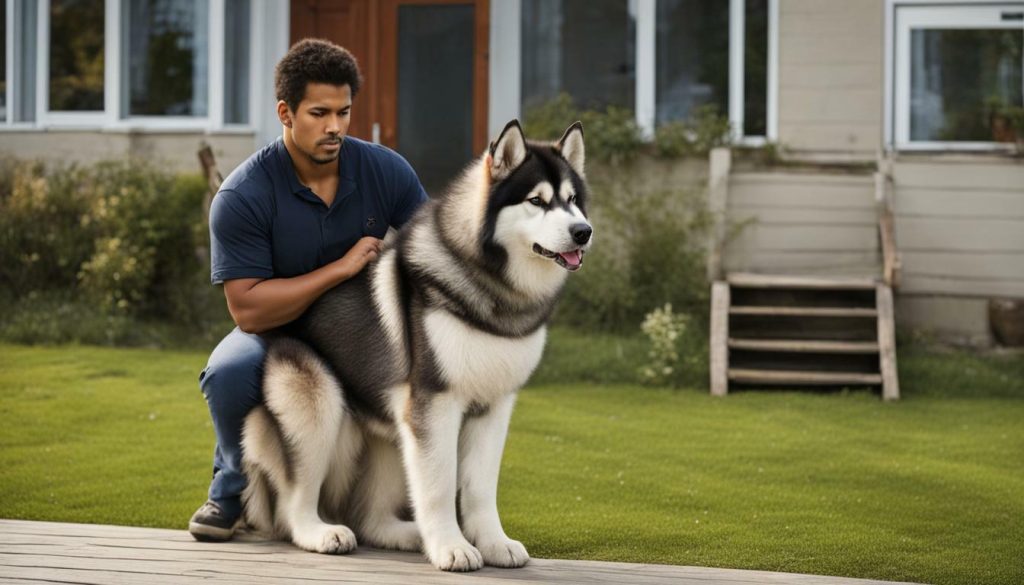
In conclusion, Alaskan Malamutes may not possess the natural temperament or traits typically associated with guard dogs. However, with proper training and socialization, they can become well-behaved and obedient family members. Their size and intimidating presence can serve as a deterrent to potential intruders, while their ability to be trained as watchdogs allows them to alert their owners to potential threats. While they may not make the best guard dogs, Alaskan Malamutes still have a valuable role in providing some level of protection and companionship to their families.
Conclusion: Alaskan Malamutes’ Role in Home Protection
While Alaskan Malamutes may not possess all the traits of traditional guard dogs, they can still play a role in home protection thanks to their size, presence, and ability to function as reliable watchdogs.
Although their friendly nature and lack of aggression towards strangers may limit their effectiveness as guard dogs, their physical presence alone can be a deterrent to potential intruders. Alaskan Malamutes are known for their impressive size and intimidating appearance, which can give any trespasser pause.
Furthermore, Alaskan Malamutes can be trained to be excellent watchdogs. Their alertness and vocal nature make them adept at noticing and alerting their owners to the presence of someone on the property. While they may not actively engage in confrontations, their barking and protective instincts can help prevent unwanted intrusions.
It is important to note that proper training and socialization play a crucial role in maximizing the home protection potential of Alaskan Malamutes. By providing them with consistent and positive training, owners can help ensure that their Alaskan Malamutes become well-behaved and obedient members of the family, enhancing their ability to fulfill their role in home protection.
In conclusion, while Alaskan Malamutes may not be considered ideal guard dogs, their size, presence, and ability to function as watchdogs make them valuable assets in the realm of home protection. With the right training, these gentle yet formidable canines can provide a sense of security and serve as loyal companions to their owners.
FAQ
Q: Are Alaskan Malamutes good guard dogs?
A: No, they are not. Alaskan Malamutes are known for their friendly demeanor, independence, and lack of aggression, which make them unsuitable for guarding purposes.
Q: Why are Alaskan Malamutes not good guard dogs?
A: Alaskan Malamutes lack the natural suspicion towards strangers that is needed in a guard dog. They are also too stubborn and independent to be highly trainable for protection duties.
Q: Are Alaskan Malamutes dangerous or aggressive?
A: No, they are not. Alaskan Malamutes are more likely to hide or grumble when upset rather than act aggressively towards intruders or threats.
Q: Can Alaskan Malamutes provide any level of protection?
A: Yes, their size and intimidation factor can serve as a deterrent to potential intruders, providing some level of protection for the home or property.
Q: Can Alaskan Malamutes be trained as watchdogs?
A: Yes, Alaskan Malamutes can be trained to be effective watchdogs. They have a keen sense of alertness and can be trained to alert their owners to the presence of someone on the property without actively engaging in confrontations.
Q: What is the role of training and socialization for Alaskan Malamutes?
A: Training and socialization are crucial for Alaskan Malamutes, regardless of their suitability as guard dogs. Proper training and socialization help them become well-behaved and obedient members of the family.
Q: Do Alaskan Malamutes have a protective nature?
A: Yes, Alaskan Malamutes have a protective nature towards their family and territory. While they may not excel as guard dogs, their physical presence and protective instincts can provide some level of security.
